Related Research Articles
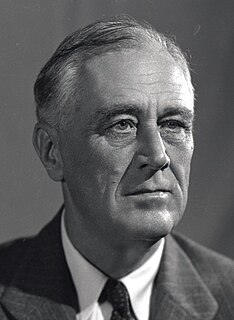
The 1944 United States presidential election was the 40th quadrennial presidential election. It was held on Tuesday, November 7, 1944. The election took place during World War II. Incumbent Democratic President Franklin D. Roosevelt defeated Republican Thomas E. Dewey to win an unprecedented fourth term. Until 1996, this would be the last time in which an incumbent Democratic president would win re-election after serving a full term in office, And the last time until 2012 in which the incumbent president won re-election with fewer electoral votes and a smaller popular vote margin that had been won in the previous election.

Thomas Edmund Dewey was an American lawyer, prosecutor and politician. Raised in Owosso, Michigan, he was a member of the Republican Party. Dewey served as the 47th governor of New York from 1943 to 1954. In 1944, he was the Republican Party's nominee for the presidency, but lost the election to incumbent Franklin D. Roosevelt in the closest of Roosevelt's four presidential elections. He was again the Republican presidential nominee in 1948, but lost to President Harry S. Truman in one of the greatest upsets in presidential election history. Dewey played a large role in winning the Republican presidential nomination for Dwight D. Eisenhower in 1952, helping Eisenhower win the presidential election that year. He also played a large part in the choice of Richard Nixon as the Republican vice-presidential nominee in 1952 and 1956. He was the first major party nominee for president of the Greatest Generation, and the first to have been born in the 20th century.

Harold Edward Stassen was an American politician who was the 25th Governor of Minnesota. He was a leading candidate for the Republican nomination for President of the United States in 1948, considered for a time to be the front-runner. He thereafter regularly continued to run for that and other offices, such that his name became most identified with his status as a perennial candidate.
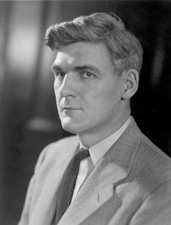
Joseph Hurst Ball was an American journalist, politician and businessman. Ball served as a Republican senator from Minnesota from 1940 to 1949. He was a conservative in domestic policy and a leading foe of labor unions. He helped draft the Taft-Hartley Act of 1947. Ball was best known for his internationalism and his support for a postwar world organization, that became the United Nations. However, after 1945, he was an opponent of the Marshall Plan.
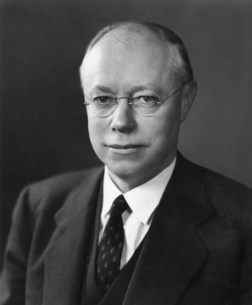
Robert Alphonso Taft Sr. was an American politician, lawyer, and scion of the Republican Party's Taft family. Taft represented Ohio in the United States Senate, briefly served as Senate Majority Leader, and was a leader of the conservative coalition of Republicans and conservative Democrats who prevented expansion of the New Deal. Often referred to as "Mr. Republican", he cosponsored the Taft–Hartley Act of 1947, which banned closed shops, created the concept of right-to-work states, and regulated other labor practices.

Leverett A. Saltonstall was an American lawyer and politician from Massachusetts. He served three two-year terms as the 55th Governor of Massachusetts, and for more than twenty years as a United States senator (1945–1967). Saltonstall was internationalist in foreign policy and moderate on domestic policy, serving as a well-liked mediating force in the Republican Party. He was the only member of the Republican Senate leadership to vote for the censure of Joseph McCarthy.
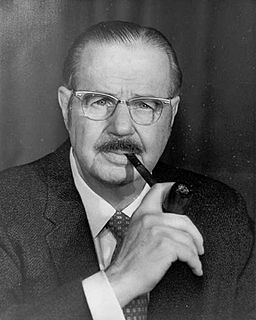
Hugh Doggett Scott Jr. was an American politician. A member of the Republican Party, he represented Pennsylvania in the U.S. House of Representatives from 1947 to 1959 and in the U.S. Senate, from 1959 to 1977. He served as Senate Minority Leader from 1969 to 1977.
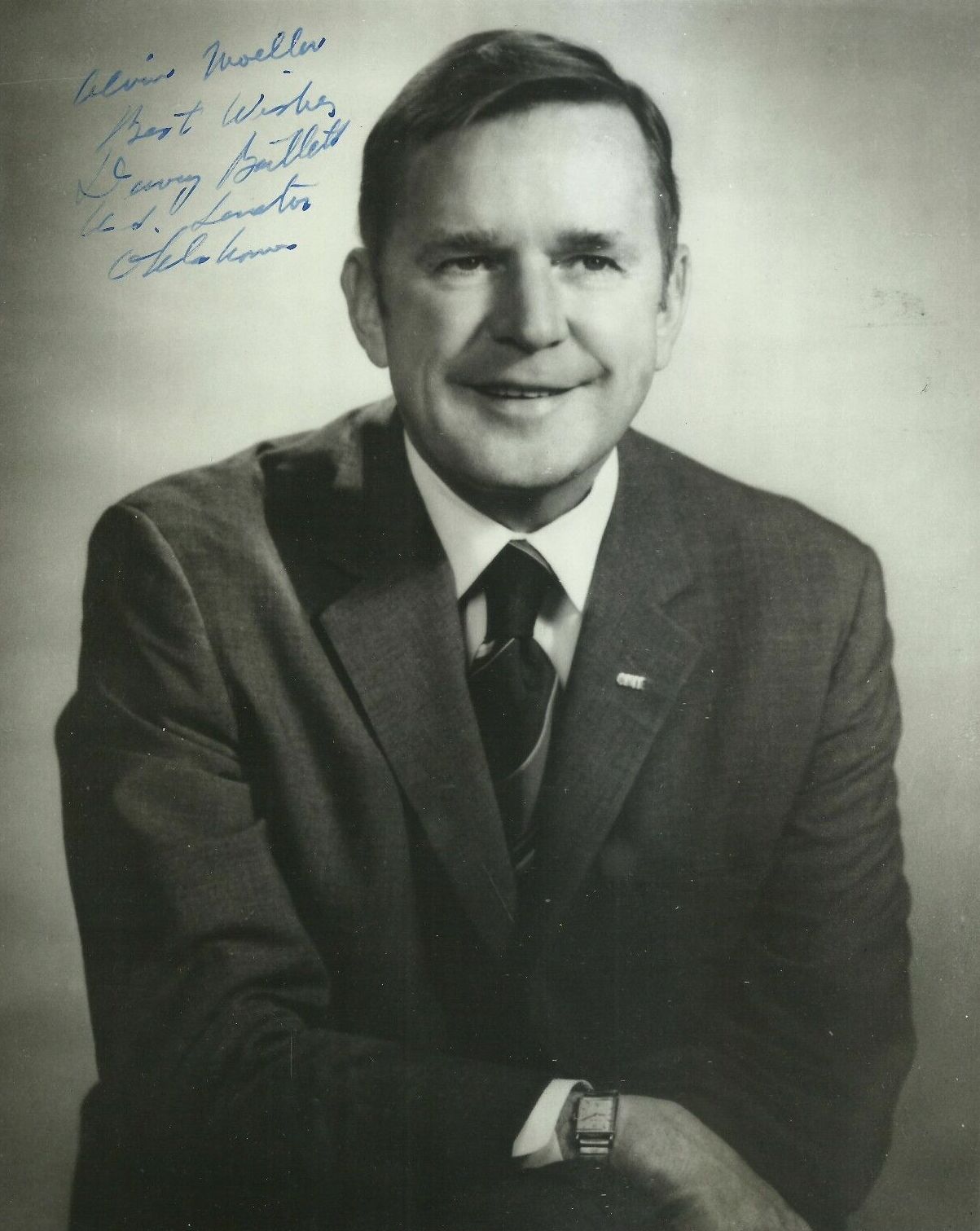
Dewey Follett Bartlett Sr. was an American politician who served as the 19th governor of Oklahoma from 1967 to 1971, following his fellow Republican, Henry Bellmon. In 1966, he became the first Roman Catholic elected governor of Oklahoma, defeating the Democratic nominee, Preston J. Moore of Oklahoma City. He was defeated for reelection in 1970 by Tulsa attorney David Hall in the closest election in state history. He was elected to the United States Senate in 1972 and served one term. In 1978, he was diagnosed with lung cancer and did not run for reelection that year. He died of complications of lung cancer two months after retiring from the Senate in 1979.
Edwin Frederick Jaeckle was a Republican politician and party chairman in New York State during the 1930s. During his tenure as chairman, Jaeckle enforced strict adherence to party discipline, which significantly bolstered the party's standing in the state.

Raymond Earl Baldwin was an American politician who served as a United States senator from Connecticut and also as the 72nd and 74th Governor of Connecticut. A conservative Republican, he was elected governor of Connecticut in 1938 during a Republican landslide promising a balanced budget, government aid to private business, and lower taxes. He sharply cut the state budget, producing a million dollars surplus. He was defeated for reelection in 1940, but was elected governor again in 1942 and 1944. He supervised a complex system of civil defense and statewide services on the homefront during the war. He planned an elaborate program to deal with the postwar reconversion of Connecticut's many warplane and munitions plants. He was elected to the Senate in the Republican landslide of 1946. As a spokesman for the small businesses of America, he compiled a conservative record in favor of less regulation, except for more regulation of labor unions through the Taft–Hartley Act. As chairman of a subcommittee of the Armed Services committee, Baldwin engaged in a long-running dispute with Wisconsin Senator Joseph McCarthy. McCarthy alleged that Baldwin was whitewashing an episode in which Army prosecutors in 1944 gained the death penalty for German soldiers accused of massacring Americans at the Malmedy Massacre. Exhausted by the highly publicized controversy, Baldwin resigned from the Senate in December 1949 to become a state judge.
The 1940 Republican National Convention was held in Philadelphia, Pennsylvania, from June 24 to June 28, 1940. It nominated Wendell Willkie of New York for president and Senator Charles McNary of Oregon for vice president.

The 1974 New York state election was held on November 5, 1974, to elect the governor, the lieutenant governor, the state comptroller, the attorney general, two judges of the New York Court of Appeals and a U.S. Senator, as well as all members of the New York State Assembly and the New York State Senate.

The 1942 New York state election was held on November 3, 1942, to elect the governor, the lieutenant governor, the state comptroller, the attorney general and two U.S. Representatives At-large, as well as all members of the New York State Assembly and the New York State Senate.
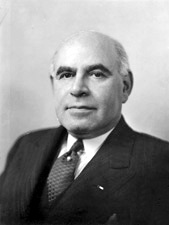
The 1938 New York state election was held on November 8, 1938, to elect the governor, the lieutenant governor, the state comptroller, the attorney general, two U.S. Senators and two U.S. Representatives-at-large, as well as all members of the New York State Assembly and the New York State Senate. The 1938 election was the first election where the Governor of New York was elected to a four year term, rather than a two year term.
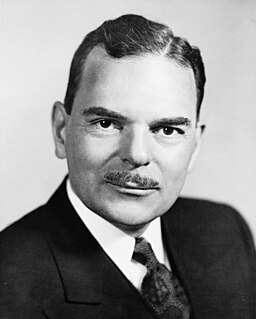
From March 12 to May 17, 1940, voters of the Republican Party chose delegates to nominate a candidate for president at the 1940 Republican National Convention. The nominee was selected at the convention in Philadelphia, Pennsylvania from June 24–28, 1940,.

Theodore Douglas Robinson was an American politician from New York who served as the Assistant Secretary of the Navy from November 1924 to 1929. He was a member of the Roosevelt family through his mother and was the eldest nephew of President Theodore "T.R." Roosevelt, Jr. (1858–1919). As an Oyster Bay Roosevelt, Theodore was a descendant of the Schuyler family.

2009 United States elections were held on Tuesday, November 3. During this off-year election, the only seats up for election in the United States Congress were special elections held throughout the year. In total, only the seat representing New York's 23rd congressional district changed party hands, increasing the Democratic Party's majority over the Republicans in the United States House of Representatives, 258–177.

The 2013 United States elections were held on Tuesday, November 5, 2013. This off-year election featured several special elections to the United States Congress; two gubernatorial races; state legislative elections in a few states; and numerous citizen initiatives, mayoral races, and a variety of other local offices on the ballot.

The 162nd New York State Legislature, consisting of the New York State Senate and the New York State Assembly, met from January 4, 1939, to October 22, 1940, during the seventh and eight years of Herbert H. Lehman's governorship, in Albany.
A perennial candidate is a political candidate who frequently runs for public office without a reasonable chance of winning. The term is the opposite of an incumbent politician who repeatedly defends their seat successfully. In the U.S., perennial candidates are usually affiliated with third party politics.
References
- ↑ Biographical History, Rolland B. Marvin Collection/Syracuse University Libraries, Retrieved 10 March 2022
- ↑ (20 October 1944). Rolland B. Martin, State Senate Choice, Has Good Record, Eagle-Bulletin (Fayetteville, New York)
- 1 2 (16 August 1979). Rolland Marvin, 82, Was Five‐Term Mayor Of Syracuse in 1930's, The New York Times
- ↑ (25 March 1971). Reflections on the passing of a great governor, Eagle-Bulletin
- ↑ Baker, Chris (6 January 2018). Who is Rolland Marvin? Walsh's speech cites one of Syracuse's greatest mayors, The Post-Standard